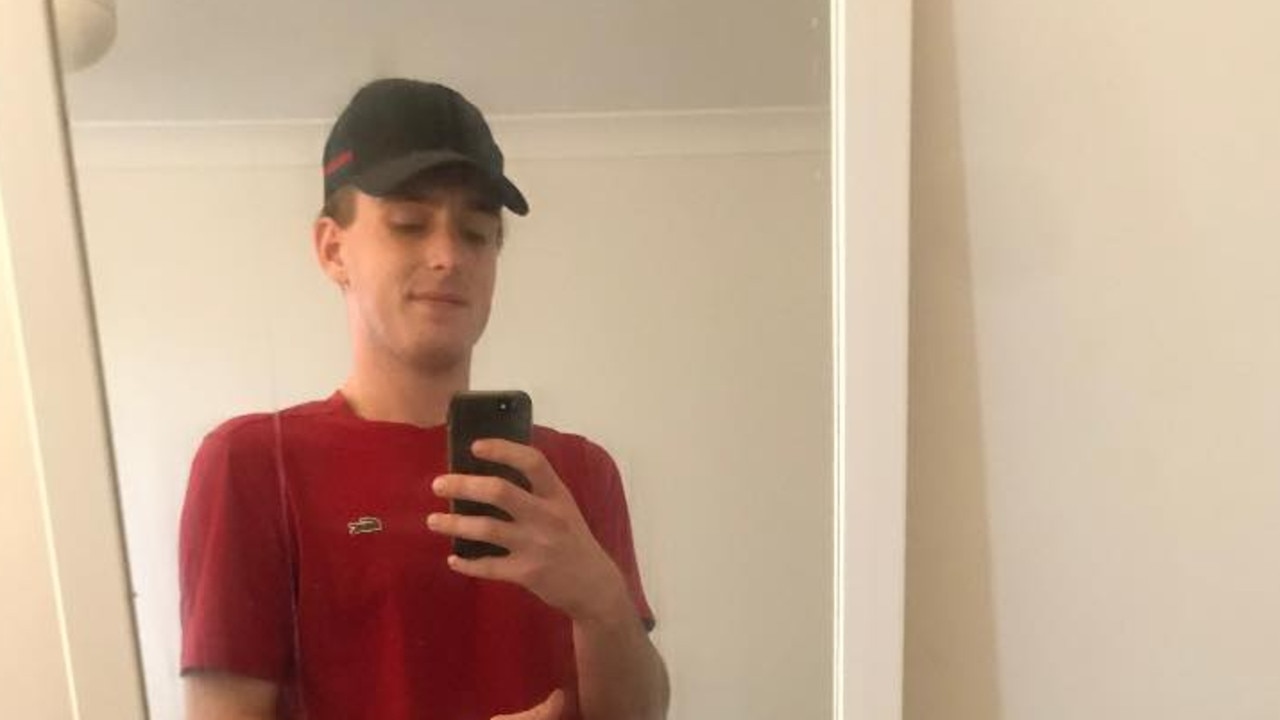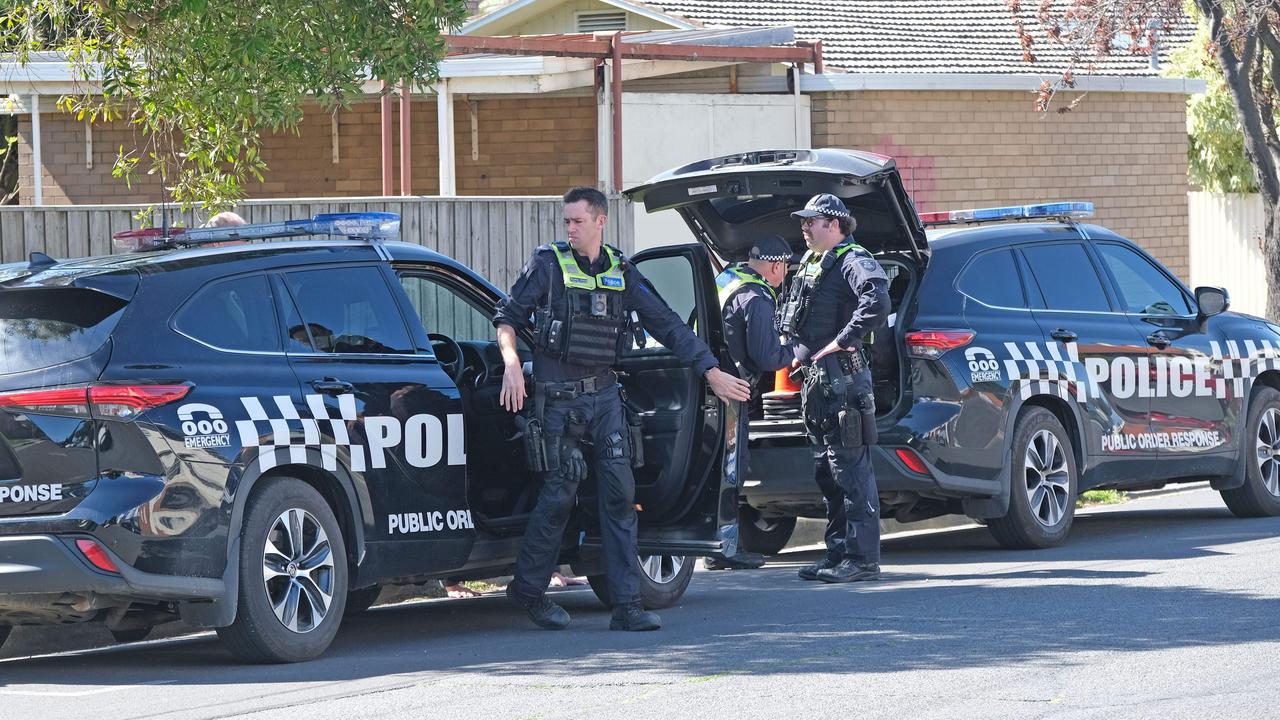Bailey Clifford plea hearing: Victim statements, submissions heard
The family of slain father Paul Grapsas have stared down his killer and described their pain and grief, as the killer read aloud his own statement to the court.

Geelong
Don't miss out on the headlines from Geelong. Followed categories will be added to My News.
The family of Paul Grapsas has aired their grief in court and stared down his killer, as the culprit’s lawyer made submissions on his behalf.
Bailey Clifford, 20, appeared in the Supreme Court at Geelong on Monday for a plea hearing, having pleaded guilty to the manslaughter of Paul Grapsas last week.
Clifford had originally been facing trial on a charge of murder, but pleaded guilty to the lesser charge at the last possible minute, as a jury pool was sitting in another room, waiting to be empanelled.
The court heard Clifford had offered to plead guilty to the charge in August last year, but the offer was rejected by the prosecution in September.
In a powerful and heart-wrenching victim impact statement she read to the court, Mr Grapsas’ wife Jessica spoke of the ongoing grief, trauma and the agony she felt.

Mrs Grapsas described feeling emotionally and practically unprepared for losing “the person who filled me up, the person I lived for on the day to day”.
She said she felt guilt towards her children, who must themselves process the loss of their father, and how she felt “the weight of missing Paul; because I cannot be Paul”.
“They will not be able to fully grieve until they fully understand,” she said.
“They will only know he loved them by photographs.”

Following her statement, a video compilation was played to the court, featuring Mr Grapsas with his children and his children since his death, including visiting his grave.
Mrs Grapsas words were the first of almost a dozen victim impact statements tendered throughout the hearing, with several read aloud.
Ms Parkes read the statement of Mr Grapsas’ mother, Cathy, who said she missed him every day and sometimes realised she had no recollection of a meeting or function because her thoughts had drifted towards her son.
“Those of us that are left, will never be the same,” she wrote.
Mr Grapsas’ mother-in-law, Josie Vandermark, said Clifford’s “reckless and senseless crime” had left the family in “tatters”, from the moment she received a “chilling” phone call at 4am” from her daughter.
Her son and Mr Grapsas’ brother-in-law, Tom Vandermark, told the court he’d lost a big brother in Mr Grapsas, who he met when he was eight years old, and there were “no words that can adequately describe the void” that Mr Graspas left.
“Paul’s children have already lost their father, my children have had to lose a part of theirs too,” he said.
Despite their grief, both Mrs Grapsas and Mr Vandermark said they would forgive Clifford.
“I will choose to forgive you every time I feel the pain, hurt, bitterness and resentment towards you,” Mrs Grapsas said.
“It doesn’t mean it doesn’t hurt, and that I’m not angry at you, it just means I release you into the hands of God,” Mr Vandermark said.
Clifford’s lawyer, barrister Moya O’Brien, began her address by acknowledging the “profound, far-reaching and never-ending grief” of Mr Grapsas’ family, in particular Mrs Grapsas, who had shown “strength, courage, bravery and eloquence” in reading her “profound and moving” statement.
In an unusual move, Clifford then read aloud a letter to the court, in which he apologised for the “pain and sorrow” he had caused.
Ms O’Brien made several submissions in mitigation, highlighting her client’s youth, early plea, remorse – which she argued was demonstrable and genuine.
She described Clifford as having the “physical appearance of someone whose life has been somewhat ravaged by addiction” in September 2023.
He was a “scrawny” teenager, “quite petite in stature”, and during the five interviews with police, he was sobbing and distraught, a “young man who is deeply troubled by what he has done”.
She told the court that Clifford had “accepted from the outset” that he was criminally responsible for Mr Grapsas’ death, and had offered to plead to manslaughter at an early stage.
The court heard Clifford had good prospects of rehabilitation and had been “head down bum up” in prison, being a “model prisoner” and working to better himself.
Clifford had a “limited criminal history” largely petty drug-related thefts, and that the killing of Mr Grapsas was an “escalation”.
Clifford grew up in Geelong and was a relatively normal upbringing, the court heard, however he struggled at school, leaving in year nine, before suffering a severe, traumatic brain injury in a 2021 car crash, the court heard.
Afterwards his life took spiralled downwards, he began using drugs and his behaviour became increasingly reckless.
Ms O’Brien told the court the killing was spontaneous and reactive, and occurred in the context of a brief altercation after Mr Grapsas confronted Clifford in his car.
Ms O’Brien said Clifford was “underneath” Mr Grapsas, and pointed to the evidence of Clifford’s associate, who said Clifford told him Mr Grapsas had punched him.
However, Ms O’Brien did not go so far as to argue the killing occurred in self-defence, stating Clifford’s actions were “clearly excessive, clearly dangerous and clearly unlawful”.
The court heard a neuropsychological report found Clifford’s cognitive ability had declined since the accident and he now had an IQ of 73, putting him in the “borderline intellectually impaired range”, Ms O’Brien said.
However, she submitted Clifford had demonstrated insight into his actions, and had access to NDIS support, meaning there would be “scaffolding” upon his eventual release.
The prosecution and defence disagreed on whether or not Clifford had picked up the knife in the car, or whether it was his own knife he had taken with him.
They also disagreed on the seriousness of the offending, with Ms O’Brien putting it in the “mid-range” and crown prosecutor Joanne Poole submitting both the offending and Clifford’s moral culpability were at the higher end of the scale.
Clifford was an “opportunistic thief” who came armed with a knife, Ms Poole said,
Ms Poole argued Clifford used the knife as a “first resort” given there were no injuries on Mr Grapsas, such as bruises, that indicated Clifford had punched or hit him first.
Clifford’s crimes were also aggravated as he did not seek medical aid for Mr Grapsas and following the crime made attempts to avoid being implicated.
The prosecution submitted his prospects for rehabilitation were “guarded”.
Justice Rita Incerti will sentence Clifford at a later date.
More Coverage
Originally published as Bailey Clifford plea hearing: Victim statements, submissions heard






